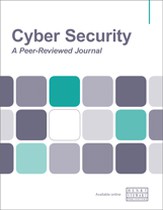Measurement of organisational variables associated with cyber security preparedness in Turkey
Abstract
This paper is an exploratory study providing five new measurements of security manager perceptions associated with organisational cyber security preparedness. According to the Health Belief Model (HBM), cyber security preparations would be influenced by security managers’ perceived threats of cybercrime and their perceived barriers to making cyber security preparation. Study participants were security managers from 215 organisations in Turkey who completed anonymous questionnaires to report organisational demographics, and to respond to a new 13-item measure of cyber security preparation. They also reported perceived threats using three new measures (types of cybercrime threat, sources of cybercrime threat, sectors threatened by cybercrime) and perceived barriers using a new measure of organisational cyber security barriers. Demographics found associated with greater cyber security preparation included being in the industrialised Marmara region, having 1,000+ employees, and having at least 3 per cent of the organisation’s budget devoted to cyber security. Greater cyber security preparation was significantly associated with security manager perceptions of more sectors threatened and, surprisingly, more organisational barriers. One interpretation of the present results would be that security managers are motivated to make cyber security preparations when they become aware of the wide range of business sectors threatened, but that in the process of making these preparations, they discover the organisational barriers they must overcome, such as insufficient budgets and insufficient government guidance.
The full article is available to subscribers to the journal.
Author's Biography
S. Hakan Can PhD began his career in law enforcement in 1984. He worked with Interpol, Anti-Smuggling department, Drugs sub-division, and Fiscal Crimes sub-divisions. After completing his PhD, he joined Pennsylvania State University in 2006. He has authored and co-authored five books (three of them for service [police] use), six book chapters and more than 40 peer-reviewed articles. His current research focus is on law enforcement organisational issues around the globe and efficiency of local police operations.
Gokhan Ikitemur PhD received his doctorate from the University of Texas at Dallas in 2014. He has held lecturing positions at the Police College in Yozgat, Turkey. Since 2003, he has served as district and deputy governor in several provincial administrations for the Turkish Ministry of Interior. His main areas of research interest are cyber security, public policy, democratisation and use of social media.
Helen M. Hendy PhD is Professor Emeritus in Psychology at Penn State University, Schuylkill Campus. Her PhD in Psychology was received from the University of California, Riverside. She has over 60 publications and her research has been funded by the National Science Foundation, National Institutes of Mental Health and Children’s Miracle Network, with two research excellence awards received from the Society of Behavioral Medicine.
